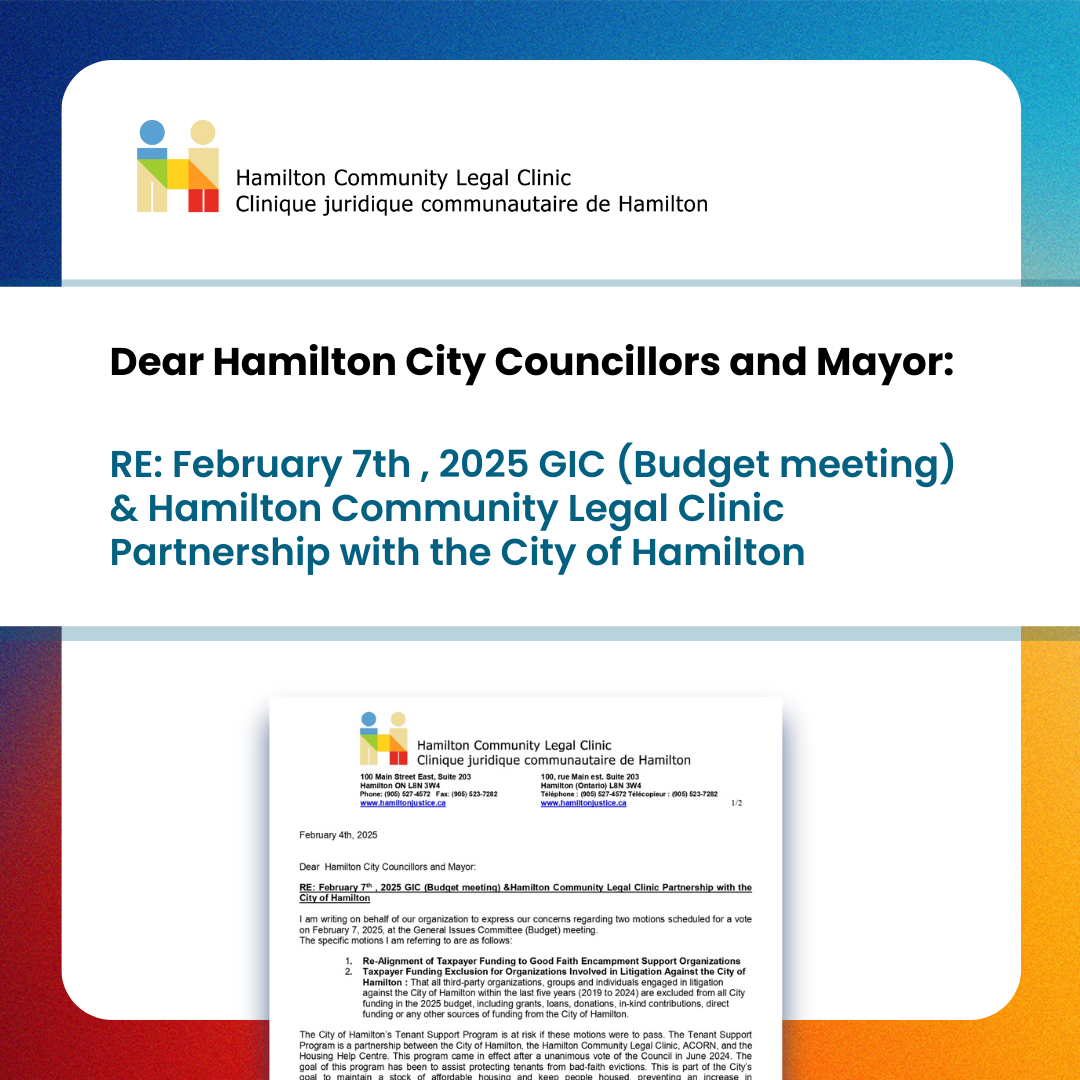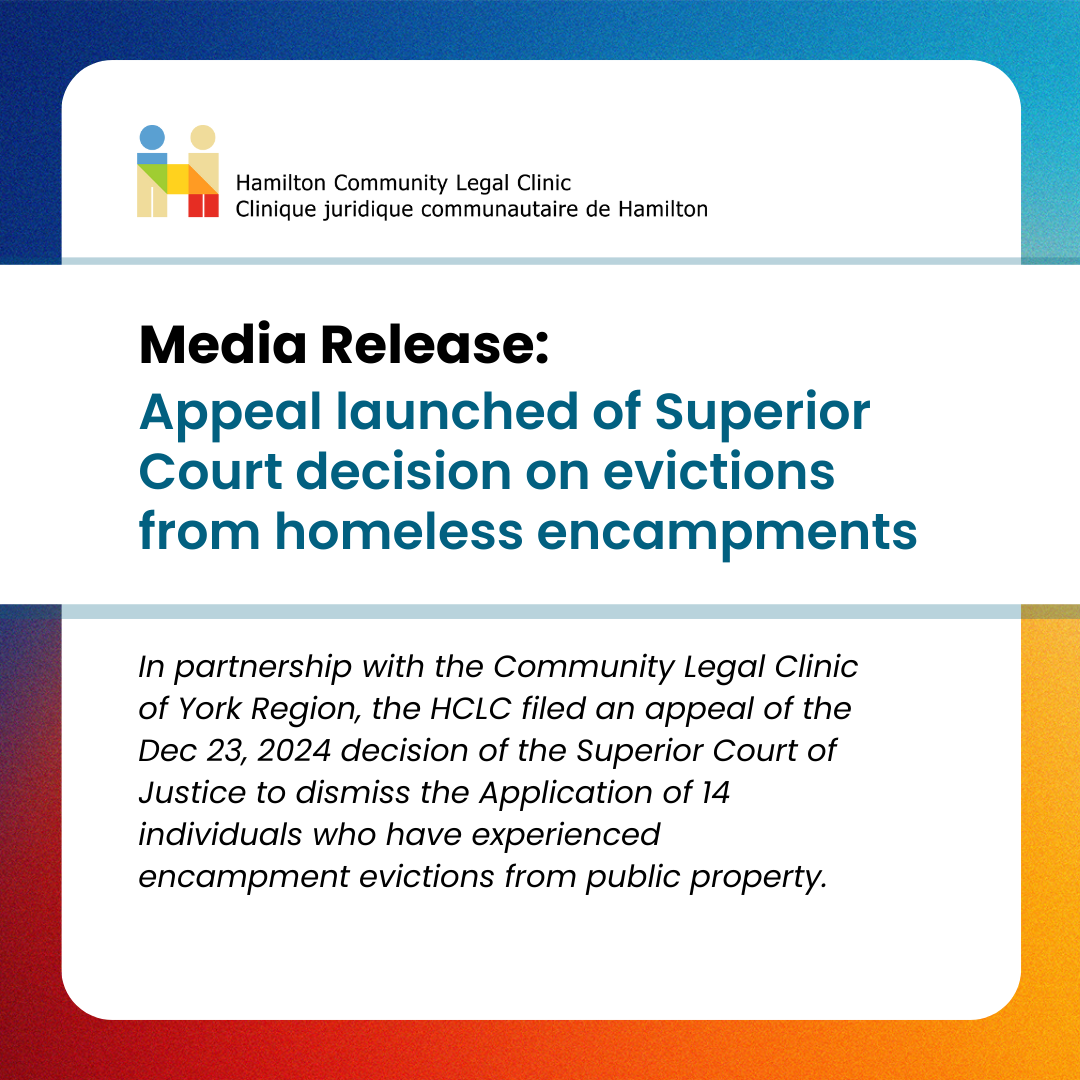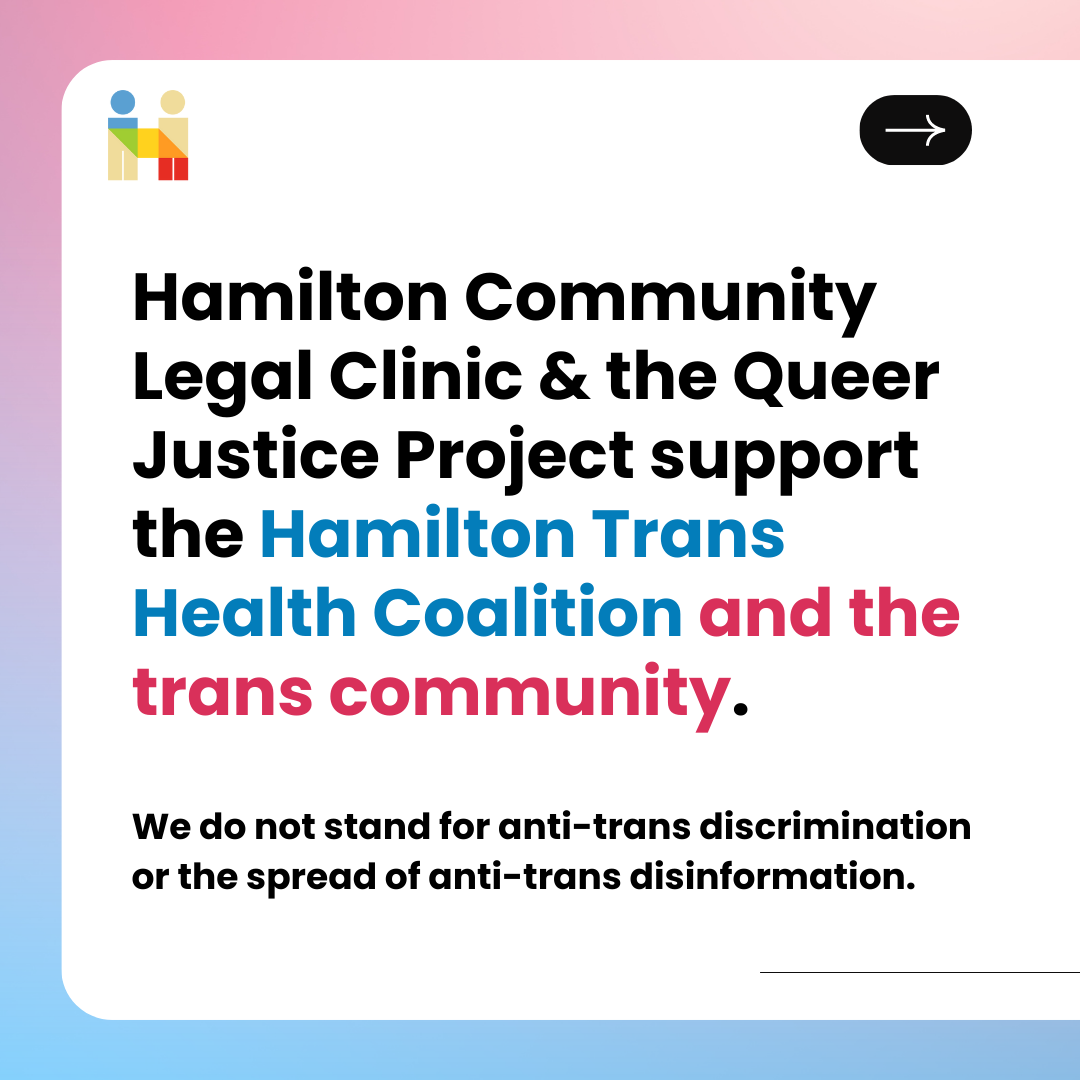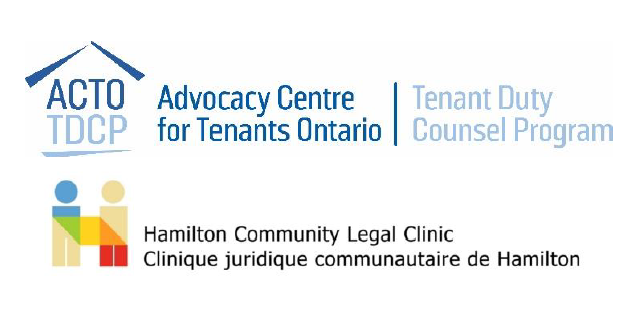
Submitted February 4, 2025 to councillors, the office of the mayor, and city city clerk.
Dear Hamilton City Councillors and Mayor:
RE: February 7, 2025 GIC (Budget) meeting & Hamilton Community Legal Clinic Partnership with the City of Hamilton
I am writing on behalf of our organization to express our concerns regarding two motions scheduled for a vote on February 7, 2025, at the General Issues Committee (Budget) meeting.
The specific motions I am referring to are as follows:
The City of Hamilton’s Tenant Support Program is at risk if these motions were to pass. The Tenant Support Program is a partnership between the City of Hamilton, the Hamilton Community Legal Clinic, ACORN, and the Housing Help Centre. This program came in effect after a unanimous vote of the Council in June 2024. The goal of this program has been to assist protecting tenants from bad-faith evictions. This is part of the City’s goal to maintain a stock of affordable housing and keep people housed, preventing an increase in homelessness.
The Hamilton Community Legal Clinic’s role in this agreement is to provide legal advice and representation to tenants and provide legal education to tenants across the City. In its original agreement with the Hamilton Community Legal Clinic, the City of Hamilton identified that it expected that the Clinic would support 200 tenants per year. The program has been in place for approximately 6 months and has provided legal advice, representation, and support to 236 tenants.
If the intent of these motions are to remove funding from the Hamilton Community Legal Clinic because we were carrying out our mandate and that one of case involved litigation against the City of Hamilton regarding the encampment eviction case this is a concerning reaction. The motions are set to harm the Tenant Support Program which is entirely separate from the encampment litigation. None of the City of Hamilton’s funding is being used for the encampment litigation.
The Hamilton Community Legal Clinic has always been pleased to work with the City of Hamilton, and this program allowed us to provide additional support to tenants in areas of law that we have not previously had the financial capacity to offer. This program provides more services to vulnerable tenants and keeps more people housed.
The Hamilton Community Legal Clinic cannot abandon its core mandate by denying legal support to tenants who wish to challenge government actions. It is a fundamental aspect of our constitution and our democracy that people can challenge and test government action to ensure that governments comply with the Charter of Rights and Freedoms.
While currently aimed at the legal clinic, these motions will have far-reaching consequences that could silence organizations, groups, and individuals, instilling fear and discouraging dissent. This approach jeopardizes community engagement and limits access to justice, ultimately weakening the foundation of collaboration and advocacy that the City of Hamilton and our community relies on.
The Hamilton Community Legal Clinic has served low-income citizens in the areas of housing, injured workers, social assistance, employment and immigration for decades. We have also served our community through public legal education, and community development. We support other community organization in their efforts to keep tenants housed throughout the city. We will continue to do that work even if the City of Hamilton chooses to end this partnership. The impact on the Hamilton Community Legal Clinic will be minimal. The effect on the community of low-income tenants whose housing is threatened will be significant. More tenants will lose their housing and will become homeless.
We urge the Mayor and Councillors to oppose these two motions. It is crucial to allow the Tenant Support Program to continue. Additionally, we must avoid creating a culture of fear and reprisal that would deter community organizations, groups, and individuals from expressing their concerns.
Sincerely,
Clare Freeman, BA, MSW, RSW
Executive Director

(Hamilton, January. 22, 2025) – Yesterday, in partnership with the Community Legal Clinic of York Region, the Hamilton Community Legal Clinic filed an appeal of the Dec. 23, 2024, decision of the Superior Court of Justice to dismiss the Application of 14 individuals who have experienced encampment evictions from public property.
The appeal was filed on behalf of the 14 individuals. We maintain that the evictions violated the 14 individuals’ right to life, liberty and security under Section 7 of the Charter of Rights and Freedoms. They further violated the Applicants’ equality rights under Section 15 of the Charter, because the evictions had a disproportionate impact on women, people with disabilities, and Indigenous peoples.
Our legal team has undertaken a comprehensive review of the Court’s 15-page decision and found there to be many areas of profound concern that warrant an appeal and consideration by the Ontario Court of Appeal. These include the issue of whether individuals were evicted overnight, an adequate analysis of Charter arguments, and the acknowledgement of the disproportionate impact of evictions on women, people with disabilities and Indigenous peoples.
The Hamilton Community Legal Clinic will make the full appeal document open to the public here on our website once the Ontario Court of Appeal provides a copy issued by the Court.
While we cannot comment in detail on the appeal while it is before the Court, it is important to recognize why the appeal was necessary.
Encampments have become an increasingly common sight as communities across Ontario grapple with rising homelessness. The affordable housing crisis, skyrocketing rents, stagnant social assistance rates, and increased cost of living are all putting unprecedented pressures on our communities. Homelessness has become a crisis to which our shelter system cannot keep pace, and shelters have operated at or over capacity for years. The question then becomes: if people can’t afford rent, and the shelters are full, where do they go?
Systemic change and action from all levels of government is needed to address the shortage of affordable housing, the need for supportive and/or transitional housing, mental health and addiction resource gaps, increased shelter capacity and accessible shelter spaces. Encampments in parks are not the solution. How we respond to the issue of homeless encampments is a critical step in creating change that supports everyone in our community.
Court decisions play an important role in that process when they rule on what municipalities can and cannot do to stay within legal and constitutional boundaries to address encampments. When an error is made in that decision, an appeal is the next step, a necessary check point to ensure court decisions are right by law. In this circumstance, it’s a necessary next step in supporting how we address homelessness in our community.
Finding solutions to homeless encampments in our city parks requires compassion and respecting the rights of all – parents and children playing in parks, the housed, and the unhoused. Legal clinics across Ontario are mandated to ensure access to justice for individuals and families living at or below the poverty line, whose circumstances have legal merit to be addressed. Everyone has a right to feel safe; and everyone has a right to a cover over their head in the rain, the snow and the cold.
These 14 individuals also have a right to the appeal process.
We will provide updates as the litigation unfolds, including approximate timelines. We are hopeful that the appeal will be heard in the fall of 2025.

Today is International Overdose Awareness Day (IOAD).
At HCLC, we pause to grieve for the lives lost and to offer compassion to those who continue to struggle. We stand with their loved ones, knowing that each life lost is a profound tragedy that underscores the urgent need for meaningful legal, health and social reform.
“For those who use drugs and those who don’t. For heartbroken friends and family members of lost loved ones. For activists who fight for sorely needed policy reform. For healthcare and harm reduction workers. For tireless advocates. Overdose can affect anyone, and we encourage you to remember the tenacity of our community. Lean into the power that we can have when we work together.” – IOAD Campaign. OverdoseDay.com
The evidence from countries like Portugal, the Netherlands, Switzerland, and others shows that decriminalizing drugs, combined with comprehensive health and social programs, leads to significant reductions in overdose deaths and improvements in public health. In Canada, we face an escalating overdose crisis that demands urgent and innovative solutions.
It is time for Canada to recognize that punitive laws and criminalization are not effective in addressing substance use disorders. It is time for Canada to know the housing affordability crisis, health crisis and systemic inequalities are compounding the Overdose crisis. Instead, Canada’s leaders and communities must focus on a legal public health reform and approaches that prioritizes harm reduction, treatment, and social support. By decriminalizing the possession of drugs for personal use and investing in comprehensive social programs—including access to affordable housing, mental health services, and addiction treatment—Canada can create an environment; like Portugal, the Netherlands and Switzerland, where individuals are supported, not punished.
We call on Canadian policy makers to adopt proven strategies from around the world. By implementing these legal and social reforms, Canada can reduce overdose deaths, improve the lives of those struggling with substance use, and create a more compassionate and effective approach to drug policy. Each life lost is one too many.
For more resources, information, and ideas on how you can support: overdoseday.com/
For more information about HLO: HamiltonJustice.ca/community-justice/mental-health-substance-involved-justice

The Hamilton Community Legal Clinic, along with co-counsel Jen Danch of Swadron Associates, will be representing the family of Attila Csanyi at the upcoming Coroner’s Inquest into his death. The inquest will begin on April 30th, 2024 at 9:30 AM and is expected to continue for two to three weeks. The fourth anniversary of Attila’s passing will fall during the proceedings, on May 2, 2024.
Attila died of a drug overdose on the roof of Jackson Square in Hamilton, Ontario on May 2nd, 2020. Seven weeks before his death Attila was evicted from his home at Sampaguita Lodging & Rest Home, a Residential Care Facility (RCF) on March 11th, 2020. His eviction occurred outside of the process outlined in the Residential Tenancies Act. Following his extra-juridical eviction, Attila was effectively displaced onto the street, and relied on Hamilton’s congregate shelter system at the turn of the 2020 COVID-19 public health crisis.
Proceedings before the Coroner
A coroner’s inquest is an opportunity for members of the public to hear about the circumstances surrounding the death of a community member and neighbour. Outcomes from a coroner’s inquest are determined by a jury, composed of members of the public. In addition to answering the five required questions mandated by the proceeding, the jury may make recommendations to various levels of government, institutions and individuals aimed at preventing future deaths under similar circumstances.
The jury will hear from witnesses for the Hamilton Police Service, City of Hamilton, St. Joseph’s Healthcare Hamilton, and Sampaguita Lodging and Rest Home, in addition to Attila’s brother and father. It is expected that experts in the areas of homelessness, residential care facilities and tenant’s rights will also be called to give evidence.
Anticipated Evidence and Recommendations Attila’s family will be seeking
We anticipate that this inquest will draw attention to the institutional failings that created the conditions for the destabilization of Attila’s housing and supportive care in the weeks prior to his death. The jury will hear evidence about the history of RCFs’ operations, oversight and funding structures; the unique vulnerabilities of residents living within care homes; and the role of community organizations and support workers in the overall care and wellbeing of RCF tenants. Ultimately, once all of the evidence is heard, the jury may make recommendations aimed at preventing future deaths of individuals in similar situations.
Having spent a significant amount of time reviewing the evidence yielded through the investigation into Attila’s death and the historical, social location of Residential Care Facilities within the current housing and health care landscape, counsel for Attila’s family anticipates recommendations may flow from and be aimed at:
Link to View the Inquest
To access the livestream for the inquest, please use this link:
https://firstclassfacilitation.ca/office-of-the-chief-coroner/inquest-into-the-death-of-Attila-Csanyi/
Media inquiries
At this time, we will be responding to media inquiries in writing. Please direct inquiries to the attention of “Counsel for the Family – Csanyi Inquest” at general@hamiltonjustice.ca

Public Health is directed by the Ministry of Health to monitor food affordability. This is achieved by conducting a survey of food costs in a sample of Hamilton grocery stores using a tool called the Ontario Nutritious Food Basket (ONFB). Food costing was conducted in Hamilton in May 2023.
Results from 2023 have been posted on the City of Hamilton’s web page, Monitoring Affordability in Hamilton: https://www.hamilton.ca/people-programs/public-health/healthy-eating/monitoring-food-affordability-hamilton.
To monitor food affordability, monthly costs of food plus the average cost of market rental housing in Hamilton are compared to incomes for eight individual and family scenarios. The family/individual income scenarios can be downloaded by clicking on this document: Household scenarios comparing income to monthly expenses in Hamilton.
The methodology used for surveying food costs in Hamilton in 2022 was repeated in 2023 and therefore results are comparable. The cost of the ONFB in Hamilton for a reference family of four (2 adults and 2 school-aged children) rose from $1031/month in 2022 to $1110/month in 2023, representing an increase of approximately 8%.
–
With the rising costs of food and rental prices, the HCLC will continue to, and encourages other individuals, organizations and stakeholders to empower our communities; especially those whose identities intersect with racial, gendered, sexual, disabled, and many other lines.

FOR IMMEDIATE RELEASE
Statement in support of Hamilton’s rejection of anti-trans disinformation
HAMILTON, ONTARIO, August 28, 2023 – We endorse the statement made by Hamilton Trans Health Coalition in response to a recent letter published in the Hamilton Spectator on July 21st. Attacks against trans and gender-diverse people are increasing in media and public discourse, abroad and at home. Everyone can and should learn to apply critical analysis to the disinformation and tactics employed in these attacks.
Trans youth are real. They know their genders and identities. Social affirmation and medical transition, when requested, are solidly evidence-based methods of ensuring their best health outcomes.
Access to evidence-based healthcare is a matter of access to justice. To learn more about our commitment to address unmet legal needs of the LGBTQIA+ and Two Spirit communities in Hamilton please visit queerjustice.ca.
Recipients of Ontario Works (OW) or Ontario Disability Support Program (ODSP) may be eligible to obtain a cooling device (such as an air conditioner) as a discretionary benefit.
As the frequency of extreme heat events occurs, the need for cooling devices increases. Those without access to cool spaces during extreme heat events can be subjected to prolonged exposure. Such exposure can cause loss of internal temperature regulation which can lead to various negative health effects or, in some cases, death.
The impacts of extreme heat events disproportionately effect certain vulnerable populations, such as the elderly, low-income earners, and individuals with existing health vulnerabilities.
Learn more, including eligibility requirements and restrictions, in OW and ODSP Discretionary Benefits and Cooling Devices (PDF). This is a resource developed by the Canadian Environmental Law Association.

May 30th, 2023
We are deeply saddened by the tragic loss of life this past Saturday when two tenants were allegedly killed by their landlord outside their home in Stoney Creek, Ontario. We extend our sincerest condolences to their families and loved ones for their loss. We urge others to respect their privacy at this time.
It has come to our attention that, over the past few days, there were many people using this horrific tragedy for their own aims and political agendas over social media about landlord and tenant relationships. Speculating on the reasons for the tragedy without all the facts available is unacceptable and has the potential to incite further violence and we condemn it. Any such comments are reckless and harmful to the victims and their loved ones.
Everyone has the right to be safe in their home, whether they rent that home or own it. Our thoughts are with the bereaved and the wider Stoney Creek community in this difficult time.



February 1, 2023
Last Friday, the Ontario Superior Court of Justice released its long-awaited decision on the Region of Waterloo’s Application to remove individuals from a homeless encampment. The Court held that the Region could not remove people from the encampment without violating their right to “life, liberty and security of the person” guaranteed by the Charter of Rights and Freedoms.
The Superior Court made the following factual findings:
We have repeatedly raised the very same issues with the City of Hamilton and continue to do so in the Charter Application currently before the Superior Court about encampments in Hamilton. We are confident that when our case is heard, the Superior Court’s judgment in the Region of Waterloo case will be followed for Hamilton.
Until the City can provide encampment residents with immediate, permanent and supportive housing, any kind of encampment eviction violates the Charter. In addition to violating the rights to life, liberty and security of the person, encampment evictions discriminate against unhoused Indigenous and racialized individuals, women, people with disabilities, the 2SLGBTQIA+ community, and families. Until the City invests in and delivers permanent, affordable housing and related supports, the Charter requires the City to permit people to use tents and other survival materials.
Instead of complying with the Charter and taking meaningful and concrete steps to respond to these longstanding concerns, the City continues to rely on By-law enforcement and eviction, and on pouring resources into fruitless litigation that could be spent on affordable housing.
Indeed, the City has just recommended hiring two additional Municipal Law Enforcement Officers, at an annual cost of $277,000.00, and two Hamilton Police Services officers at an annual cost of $268,646.00 (see agenda item 10.4). Policing continues to be a violent and inappropriate solution to the lack of affordable housing. We oppose it unequivocally.
The City’s own Report arising from consultation sessions states “encampment evictions have profoundly negative impact on people’s physical and mental well-being.” The Superior Court reached the same conclusion. It remains to be seen whether Council will finally acknowledge these profound harms, move away from By-law enforcement, and focus on the creation of affordable housing.
The Hamilton Community Legal Clinic, Hāki Chambers Global, Ross & McBride, and the Community Legal Clinic of York Region, continue to challenge the City’s discriminatory approach to encampments and unhoused residents in Court, until such time as Council takes steps to remedy the harm the City has caused to houseless residents.
For media inquiries please contact:
Sujit Choudhry: (416) 436-3679, (917) 683-1380
Sharon Crowe: (437) 218-2364
Ashley Wilson: (905) 572-5833
On November 24th, 2022, a hate rally was organized in response to a family-friendly Drag Storytime event being held at the Terryberry library. Unfortunately, in response to the organization of this event, a small group of bigots gathered in an attempt to disrupt and protest. The words and actions of this group were in line with the rising tide of violence and hate that Queer communities across Canada are facing. Their allegations against the organizers, talent, and Queer community more broadly, have no basis in reality, and are irresponsible, ignorant, and dangerous. The Queer Justice Project and the Hamilton Community Legal Clinic condemn this hateful demonstration.
Such events are displays of ignorant bigotry that are putting our Queer communities in danger. It must not rest solely on Queer communities to bear witness, defend against, and call out this pattern of hate and violence. For our community at large, who might be just engaging with issues impacting the Queer community, we encourage you to take advantage of numerous educational and informational tools that can accessed online, including through the Hamilton Public Library. Queerness challenges and calls on all of us to reconsider beliefs and realities about more than just gender and sexuality but about how we love and live alongside each other in ways that respect and celebrate differences. All members of our community should rise to that challenge out of a shared spirit of love and acceptance – and not hatred and violence.
View the full statement on anti-2SLGBTQ+ action at Terryberry library